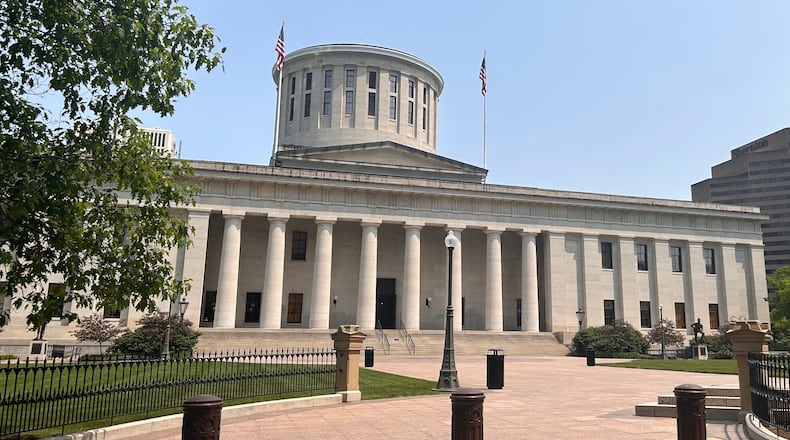The law would include sales of delta-8, one of over 100 hemp-derived cannabinoids and one of just a handful shown to have psychoactive effects. It’s known to be more mild than delta-9, more commonly referred to as just plain THC, which is abundant in marijuana plants.
However, Huffman said manufacturers can now tweak delta-8 into increasingly psychoactive derivatives that are technically shielded by the 2018 Federal Farm Bill, which legalized hemp as a crop.
“There’s this gray area. It’s hemp, but you can convert it,” Huffman said of delta-8. “It’s under the farm bill, so it’s legal, but you can convert the stuff in hemp into intoxicating stuff, and that’s what you see in some of these stores that the governor wants to regulate.”
DeWine worked with the Senate to pass an Issue 2 reform bill that would have, among other things, done away with the “vast, vast majority” of hemp-derived cannabinoids, intoxicating or not, according to Huffman. The bill has not been taken up by the House.
In a press conference this month, DeWine again asked the General Assembly to either fully ban delta-8 or at least age restrict sales to adults 21 years old or older. The governor cautioned that the compound could be converted, but also criticized the manufacturers and sellers of specific products for targeting kids directly with colorful packaging that spoofs popular brands or boasts athlete endorsements.
The press conference and the Senate bill, which has been pointedly ignored by the Ohio House for nearly two months, concerned hemp industry advocates and local shop owners that maintain that many of the over 100 non-intoxicating hemp-derived cannabinoids, like CBD, can provide real benefits to customers.
Huffman said his proposed bill intends to keep the products DeWine is worried about out of the hands of children, while keeping shop owners in business.
“We’re going to try working with the governor to get a bill that keeps the CBD stores open, but with good product, and try to get rid of the intoxicating things and require an age limit of 21 to buy hemp with any type of derivatives in it,” Huffman said.
Huffman said industry advocates are in favor of such regulations because the good-faith stores don’t want to be associated with business that sell psychoactive products to minors.
Huffman’s bill, yet to be formally introduced, is the latest installment in the state’s debate over how to regulate marijuana and similar products in the wake of Ohioans voting in November to legalize adult-use recreational marijuana under Issue 2.
The House has long been working on its own plan, House Bill 354, to tackle the topic and leadership has made it clear that they don’t want to rush any revisions to Issue 2.
It’s not clear if H.B. 354 will be amended to include delta-8 regulation. Bill sponsor Rep. Jamie Callender, R-Concord, was unable to be reached in time for this story’s publication.
DeWine and the Senate would like the situation resolved soon, but with only one session scheduled for each chamber between now and April 10, any resolution is unlikely before primaries are over.
Follow DDN statehouse reporter Avery Kreemer on X or reach out to him at Avery.Kreemer@coxinc.com or at 614-981-1422.
About the Author

